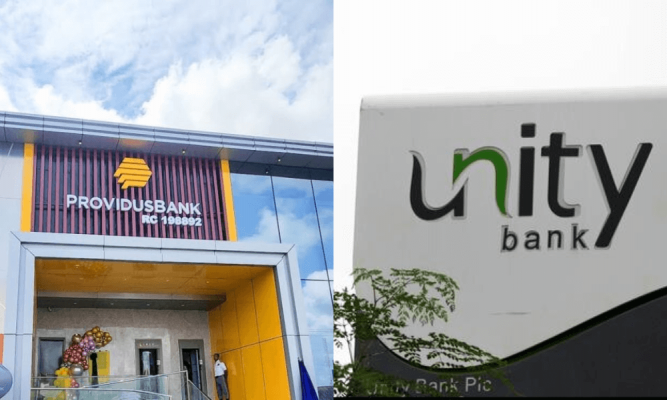
Unity Bank, Providus Merger Signals Strategic Rebirth
- Business
- 03.09.2025
- 2 Comments
- 104
Unity Bank, Providus Merger Signals Strategic Rebirth
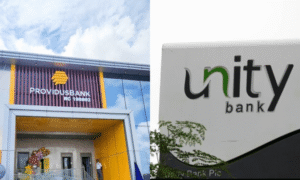
strategic rebirth in Nigeria’s evolving financial sector. As the Central Bank of Nigeria (CBN) continues to push for
stronger, more resilient financial institutions, this consolidation represents a bold step towards strengthening
liquidity, improving competitiveness, and expanding digital banking capabilities across the country.With Unity Bank’s strong retail presence in rural and semi-urban areas and Providus Bank’s reputation for innovation,
fintech partnerships, and SME support, the merged entity is positioned to emerge as a formidable player
in Nigeria’s highly competitive banking sector.
Increasing regulatory requirements, higher capital adequacy thresholds, and the need for digital transformation
have made mergers and acquisitions a survival strategy for many institutions.
The Unity-Providus deal aligns with the CBN’s recapitalization policy, which encourages banks
to meet stronger capital bases in preparation for future economic shocks.
Key Insight: This merger symbolizes the blending of Unity Bank’s grassroots reach with Providus Bank’s digital-first model, creating a hybrid bank that can serve both traditional and tech-savvy customers.
Unity Bank
Unity Bank has long been known for its retail focus, serving millions of customers, particularly in
agricultural communities and underserved regions. Despite financial challenges in recent years,
the bank retained its niche as a grassroots financial partner, with deep ties to smallholder farmers, traders,
and micro-enterprises.
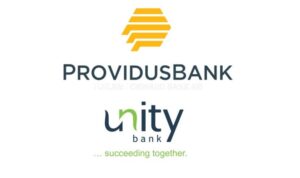
Providus Bank
Established as one of Nigeria’s new-generation banks, Providus has built a reputation for agility,
technology-driven solutions, and partnerships with fintech companies. Its strength lies in supporting SMEs,
digital entrepreneurs, and corporate clients who demand flexible and innovative financial services.
Strategic Goals of the Merger
- Capital Strengthening: To meet CBN’s recapitalization requirements and build a stronger balance sheet.
- Customer Base Expansion: Combining Unity’s nationwide presence with Providus’ tech-driven customer acquisition strategy.
- Digital Banking Growth: Leveraging Providus’ fintech partnerships to modernize Unity’s infrastructure.
- SME and Retail Focus: Blending Providus’ SME expertise with Unity’s retail dominance to serve Nigeria’s largest economic sectors.
- Risk Diversification: Spreading operational risks across multiple markets, products, and customer segments.
and better digital platforms. Rural customers will gain access to Providus’ advanced mobile banking services,
while SMEs and startups will benefit from Unity’s wider branch network.
- Seamless digital banking and mobile wallet integration.
- Expanded ATM and branch access across Nigeria.
- Tailored loan products for farmers, SMEs, and corporate clients.
- Enhanced customer service through AI-driven platforms and call centers.
It highlights the trend towards consolidation, where smaller or financially strained institutions
join forces with agile, technology-driven banks to remain competitive.The deal is expected to:
- Encourage other mid-tier banks to pursue mergers for survival.
- Increase confidence in Nigeria’s banking sector among investors.
- Accelerate financial inclusion, particularly in underserved rural regions.
- Improve Nigeria’s standing with global credit rating agencies and international lenders.
citing the need to support Nigeria’s $1 trillion economy vision.
With inflation, currency volatility, and security challenges affecting growth,
the Unity-Providus merger provides a safety net by pooling resources and diversifying risks.Analysts believe that mergers of this scale are likely to dominate the financial sector over the next decade,
as regulators push for fewer but stronger banks capable of financing large infrastructure projects,
supporting SMEs, and competing with global financial institutions.
| Feature | Unity Bank | Providus Bank | Merged Advantage |
|---|---|---|---|
| Market Reach | Strong in rural and semi-urban regions | Focused on urban and digital customers | Nationwide coverage across all demographics |
| Technology | Moderate adoption | Fintech-driven, highly digital | Balanced tech ecosystem with improved infrastructure |
| Customer Base | Farmers, traders, retail customers | SMEs, corporates, tech businesses | Diversified portfolio with reduced risk |
| Capitalization | Weaker capital base | Relatively stronger capital base | Strengthened capital to meet CBN requirements |
and managing employee redundancies will be critical. However, if executed properly, the Unity-Providus alliance
could serve as a blueprint for sustainable banking mergers in Nigeria.Industry watchers predict that within the next five years, the merged entity could evolve into one of the
top-tier banks in Nigeria, challenging the dominance of bigger players like GTBank, Zenith, and Access Bank.
With increased investment in fintech partnerships, artificial intelligence, and blockchain-based services,
the bank could position itself as a digital-first financial powerhouse.The Unity Bank and Providus Bank merger represents more than a financial arrangement;
Is Unity Bank Merging with Providus Banned?
No, the Unity Bank and Providus Bank merger is not banned. In fact, the move aligns with the
Central Bank of Nigeria (CBN)’s recapitalization drive, which encourages Nigerian banks to consolidate
in order to build stronger financial institutions. The merger is a strategic decision aimed at strengthening
liquidity, improving operational efficiency, and expanding service reach nationwide.
Instead of being banned, the Unity-Providus merger has received regulatory attention and approval as part of Nigeria’s ongoing financial reforms.
What is Happening to Providus Bank?
Providus Bank is undergoing integration into Unity Bank’s structure as part of the merger deal.
The bank will continue to operate but with a new corporate identity that blends Providus’ strength in
digital banking, SME support, and fintech partnerships with Unity Bank’s wide retail network.
Customers of Providus Bank can expect continuity in services with added benefits such as:
- Access to Unity Bank’s larger branch and ATM network.
- Stronger financial backing from the combined capital base.
- Improved digital banking platforms powered by Providus’ fintech expertise.
- Broader loan and savings products for individuals, SMEs, and corporate clients.
Essentially, Providus Bank is not shutting down; it is being restructured into a stronger, larger entity
through the merger.
How Many Banks Have Merged with Unity Bank?
Historically, Unity Bank was born out of the merger of nine banks in 2006, making it one of Nigeria’s
major consolidation stories during the first wave of bank recapitalization under the then CBN Governor,
Charles Soludo. Those nine legacy banks came together to form Unity Bank Plc, giving it a wide presence
across Nigeria.
Now in 2025, Unity Bank is merging with Providus Bank, marking another chapter in its consolidation journey.
This means that including Providus, ten banks in total have come together under Unity Bank’s umbrella
since its inception.
Unity Bank started as a merger of nine banks in 2006. With the addition of Providus in 2025, it represents the tenth consolidation under the Unity brand.
hybrid institution that combines grassroots banking with advanced digital solutions.
Customers will see expanded services, better loan access, and more robust online platforms.
For the Nigerian economy, this signifies greater financial inclusion, job opportunities, and increased
confidence in the resilience of local banks.

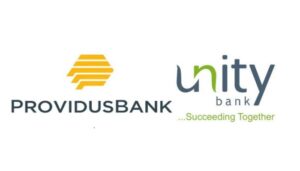
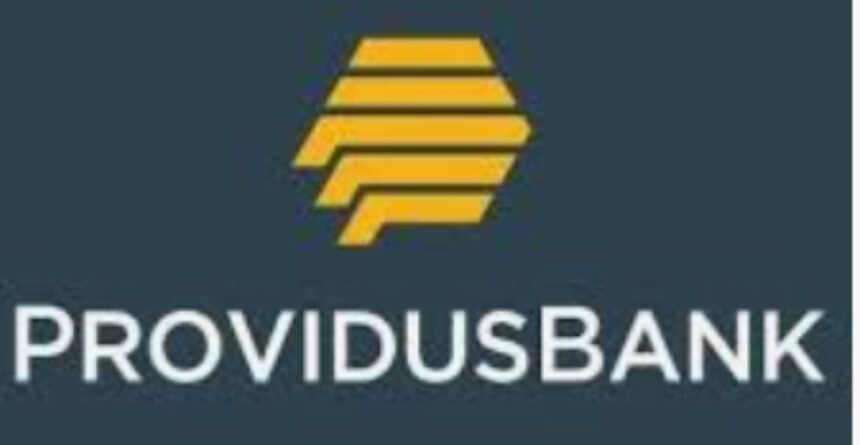




2 Comments
[…] Trending TECNO’s SPARK Slim is the world’s slimmest entry-level smartphone Unity Bank, Providus Merger Signals Strategic Rebirth BREAKING: FG Declares Friday Public Holiday for Eid-ul-Mawlid WAEC Vows Full Switch to CBT […]
[…] Unity Bank, Providus Merger Signals Strategic Rebirth […]